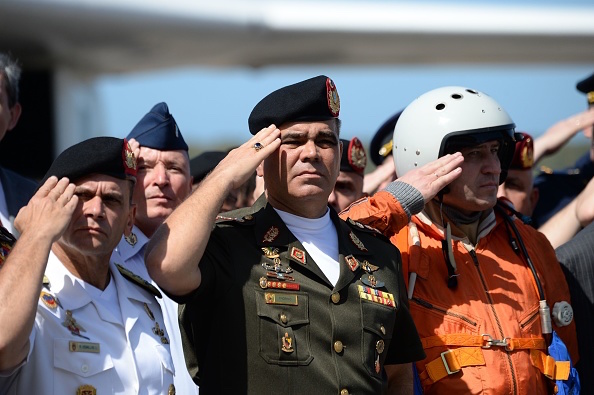Washington and Moscow traded hostile remarks on Dec. 10 and Dec. 11 after Russia sent a fleet of aircraft, including a pair of nuclear-capable bombers, to Venezuela in a show of support.
The Russian Ministry of Defense announced that two Tu-160 strategic bombers landed at the Maiquetia airport in Venezuela on Dec. 10. The bombers were accompanied by a transport plane and a long-haul aircraft. The aircrews were greeted on the ground by a Venezuelan welcoming party.
U.S. Secretary of State Mike Pompeo slammed the move shortly after, calling it a waste of public funds by “two corrupt governments.” The spokesman for Russian President Vladimir Putin was quick to respond, calling Pompeo’s statement “undiplomatic” and “totally inappropriate.”
The war of words over the aircraft deployment is the latest escalation of tensions between Russia and the United States, driven largely by Russia’s provocations on the global stage. Less than two weeks ago, President Donald Trump canceled a scheduled meeting with Putin at the G-20 summit in Argentina, citing Russia’s seizure of Ukrainian ships and sailors in the Kerch Strait.
The Russian defense ministry said the 6,000-mile flight was in accordance with international airspace rules, adding that F-16 Fighting Falcon jets of the Norwegian Air Force shadowed the Russian aircraft at separate stages of the journey. Venezuelan Minister of Defense Padrino Lopez said the bombers would participate in a joint exercise with Venezuelan planes, according to Russian state-owned news agency TASS.
Pompeo’s Venezuelan counterpart, Foreign Minister Jorge Arreaza issued a statement pointing to America’s significant military presence in the region.
“The backlash [by Mike Pompeo] against military cooperation between Russia and Venezuela is not only disrespectful, it is cynical: the US has at least 800 military bases (known) in 70 countries. Today 75 of the 107 US programs for security cooperation, operate in Latin America,” Arreaza wrote on Twitter.
As the Russian bombers headed to Venezuela, a senior State Department official told reporters in a conference call that Russia’s latest aggression in Kerch is a reminder that America’s allies in Europe must take steps to wean themselves off dependence on Russian energy. During the call with reporters, Francis Fannon, the assistant secretary at the State Department’s Bureau of Energy Resources, specifically targeted Russia’s proposed Nord Stream 2 pipeline, saying that Washington is rallying allies to oppose the project.
“Unlike the United States, Russia’s energy companies are an extension of the state, and the Russian state uses energy for coercive political aims. Through Nord Stream 2, Russia seeks to increase its leverage of the West while severing Ukraine from Europe,” Fannon said Dec. 10.
Russia conducted similar missions to Venezuela in 2008 and 2013, according to TASS.
Sen. Marco Rubio (R-Fla.) appeared to have predicted Russia’s move in a Nov. 13 Twitter message. Rubio warned at the time that if Venezuelan President Nicolas Maduro invites Russian bombers to Venezuela, Putin would fly the planes on patrol in the Caribbean and the Gulf of Mexico.
“It would not just be a highly provocative act by Russia, it would further confirm that the Maduro regime poses a threat to the national security of the U.S.,” Rubio said on Nov. 13.
His suspicions confirmed, Rubio said Dec. 11 that Russia would fly a patrol mission as early as Dec. 12 to “prove they can project power in W. Hemisphere from Venezuela.”
“Instead of sending bombers, why doesn’t Putin send food & medicine for the suffering people of Venezuela?” Rubio added.
The Tu-160 bomber is the heaviest and largest combat aircraft now in use, as well as the world’s fastest bomber. The aircraft’s wings can change position during flight, making it possible to alter the shape of the aircraft. The Tu-160 also can carry as many as 12 nuclear-capable missiles.
Russia last used the Tu-160 bombers against targets in Syria in 2015. During the 2013 deployment to Venezuela, the bombers violated Colombia’s airspace and were escorted out by Colombian fighter jets.
Last month, U.S. labeled Venezuela, Cuba, and Nicaragua as the “troika of tyranny.” National Security Advisor John Bolton said the three countries are “the genesis of a sordid cradle of communism in the Western Hemisphere.”
Once a thriving, oil-rich nation, Venezuela has been impoverished by years socialist policies, forcing millions to flee from disease and starvation. U.S. has repeatedly sanctioned the regime in an attempt to pressure Maduro to give up his authoritarian reign. Trump has not ruled out a military option.
From The Epoch Times


